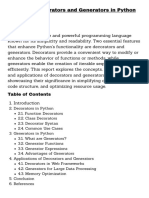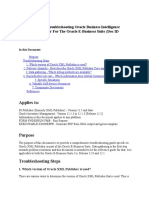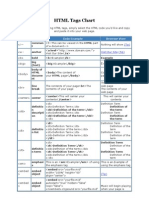Loglan 05 External Func HC
Loglan 05 External Func HC
Uploaded by
alisantosodarrian14Copyright:
Available Formats
Loglan 05 External Func HC
Loglan 05 External Func HC
Uploaded by
alisantosodarrian14Original Title
Copyright
Available Formats
Share this document
Did you find this document useful?
Is this content inappropriate?
Copyright:
Available Formats
Loglan 05 External Func HC
Loglan 05 External Func HC
Uploaded by
alisantosodarrian14Copyright:
Available Formats
5 External Functions
Contents
Overview . . . . . . . . . . . . . . . . . . . . . . . . . . . . . . . . . . . . . . . . . . . . . . . . . . . . . . . . . . . . . . . . . . . . 2
Loglan Program Structure . . . . . . . . . . . . . . . . . . . . . . . . . . . . . . . . . . . . . . . . . . . . . . . . . . . . 2
Example 1: Calling External C Function . . . . . . . . . . . . . . . . . . . . . . . . . . . . . . . . . . . . . . . . . 3
Example 2: Calling External Fortran Function in Windows . . . . . . . . . . . . . . . . . . . . . . . . . . 5
Index . . . . . . . . . . . . . . . . . . . . . . . . . . . . . . . . . . . . . . . . . . . . . . . . . . . . . . . . . . . . . . . . . . . . . . . . 9
Geolog® 7 – Paradigm™ 2011 External Functions 5-1
With Epos® 4.1 Data Management
Overview
External functions may be called from within a Loglan program. Because the Loglan program is converted
to C, it is easier if the external function is also written in this language, although Fortran may also be called
if the argument passing mechanism is compatible.
NOTE All parameters and variables are to be in lowercase to prevent compilation failure.
Loglan Program Structure
Because Loglan does not allow unknown (external) functions to be directly called, it is necessary to enter C
mode to call an external function. This is done as follows:
.cc_begin
variable = user_function ( arg1, arg2, arg3... )
.cc_end
All numeric variables in Loglan programs are of type "double"; this may cause difficulties with Fortran
subroutines with "integer" or "real" arguments. In this case, local variables of the appropriate type may
need to be declared (within "C Mode").
Most fortran compilers append an underscore to the name of an external. For example, to call a routine
declared in Fortran as
subroutine exttst ( integer, real, double )
using Loglan variables var1, var2, and var3, you would need:
.cc_begin
{
integer arg1;
float arg2;
arg1 = var1;
arg2 = var2;
exttst_ ( &arg1, &arg2, &var3 );
var1 = arg1; /* Required if the first argument is modified. */
var2 = arg2; /* Required if the second argument is modified. */
}
.cc_end
Include files containing prototype definitions may be specified using Tools > Externals from the menu in
mui_loglan. If no function prototypes have been used, the types of the arguments MUST match those
expected by the external function. Returned arguments need to be passed by address (by preceding the
argument name by "&" in the call).
Compilation and Linking
Files containing compiled external functions are passed to loglan_compile by the OBJS or EXTLIBS
arguments.
Geolog® 7 – Paradigm™ 2011 External Functions 5-2
With Epos® 4.1 Data Management
If these are defined using mui_loglan, they will be automatically passed to loglan_compile when the Loglan
program is compiled. The OBJS parameter ("External Objects" in mui_loglan) is a space separated list of
files to be linked with the Loglan program. Each entry in the list is used as follows:
• If a directory is supplied, the entry (suffixed with ".o" if no extension is supplied) is added to the
list of files to be linked.
• If the entry does not contain a directory, "./loglan" is used, and the extension is checked. If the
extension is non-blank and is not ".c", "C", ".cpp", ".cc" or ".f", the entry will be used as specified.
If the extension is any of the above, the source file will be compiled and the resultant object file
will be used. If the extension is blank, a source file (C or Fortran) will be compiled if either the
source file is newer than the corresponding object file, or the corresponding object file does not
exist; the object file is then added to the list of files to be linked.
NOTE In Windows, to set the Fortran compiler variable use the Windows short name. The
following example gives a guide:
set env(PG_F77) "C:/PROGRA~2/Intel/Compiler/Fortran/10.1.025/em64t/bin/ifort.exe"
Example 1: Calling External C Function
The following is an example of a Loglan program which uses an external C function.
Geolog® 7 – Paradigm™ 2011 External Functions 5-3
With Epos® 4.1 Data Management
Geolog® 7 – Paradigm™ 2011 External Functions 5-4
With Epos® 4.1 Data Management
Example 2: Calling External Fortran Function in Windows
The following is an example of a Loglan program which uses an external Fortran function. The Loglan and
associated external files used in the example are located in <geolog install>/doc/examples/loglan directory.
NOTE This example works on Linux but it may be simpler as it is possible that the Fortran
compiler location will be in the path so there would be no need for the PG_F77 environment
variable to be set.
Geolog® 7 – Paradigm™ 2011 External Functions 5-5
With Epos® 4.1 Data Management
Geolog® 7 – Paradigm™ 2011 External Functions 5-6
With Epos® 4.1 Data Management
Geolog® 7 – Paradigm™ 2011 External Functions 5-7
With Epos® 4.1 Data Management
Geolog® 7 – Paradigm™ 2011 External Functions 5-8
With Epos® 4.1 Data Management
Index
E
environment variable
PG_77 3
external function
Loglan call 2
L
Loglan
difficulties with Fortran subroutines 2
external function call 2
program structure 2
P
PG_F77
environment variable 3
program structure
Loglan 2
Geolog® 7 – Paradigm™ 2011 External Functions 5-9
With Epos® 4.1 Data Management
You might also like
- Report On Decorators and Generators in PythonDocument7 pagesReport On Decorators and Generators in PythontechmentorprotmpNo ratings yet
- TAFJ LoggingDocument21 pagesTAFJ LoggingT24LINK.COMNo ratings yet
- COMMON RPG Certification Parts 1 - 4Document60 pagesCOMMON RPG Certification Parts 1 - 4Ramana VaralaNo ratings yet
- Log4j TutorialDocument13 pagesLog4j TutorialSelvam AmarsinghNo ratings yet
- Unix&Network Programming: Study of Multiuser Operating System and Their Features"Document36 pagesUnix&Network Programming: Study of Multiuser Operating System and Their Features"imadprNo ratings yet
- Log4j Configuration GuideDocument6 pagesLog4j Configuration GuideGnanaPrakash BalagalaNo ratings yet
- Direct Calling LANSA From RPGLEDocument4 pagesDirect Calling LANSA From RPGLEaspect080288No ratings yet
- TAFJ LoggingDocument21 pagesTAFJ LoggingFry LennonNo ratings yet
- PlexPlug InframeworkDocument122 pagesPlexPlug InframeworkichabaldNo ratings yet
- Functions_6Document4 pagesFunctions_6DeepikaNo ratings yet
- Loglan 07 Combiner HCDocument7 pagesLoglan 07 Combiner HCalisantosodarrian14No ratings yet
- Log 4 Net OverviewDocument8 pagesLog 4 Net Overviewcall_vipvipin725No ratings yet
- 3RD PracticalsDocument11 pages3RD PracticalsTARANGITNo ratings yet
- Program Profiling - Practical Go Lessons-36Document39 pagesProgram Profiling - Practical Go Lessons-36prsnortinNo ratings yet
- Replay A Log On Petri Net For Conformance Analysis Plug-In PDFDocument11 pagesReplay A Log On Petri Net For Conformance Analysis Plug-In PDFNovandi BanitamaNo ratings yet
- Com221 Fortran LangDocument61 pagesCom221 Fortran LangIorlaha SamuelNo ratings yet
- MODIS Level 2 Corrected Reflectance Science Processing Algorithm (CREFL - SPA) User's GuideDocument10 pagesMODIS Level 2 Corrected Reflectance Science Processing Algorithm (CREFL - SPA) User's GuideguttikondanithindevNo ratings yet
- 02 Fortran 1x2Document20 pages02 Fortran 1x2Anonymous 1rLNlqUNo ratings yet
- What Is Log4J and How Do I Use It?: SashiDocument19 pagesWhat Is Log4J and How Do I Use It?: SashiMizulIkhsanMazlanNo ratings yet
- FortranDocument80 pagesFortranprakhartripathi826No ratings yet
- File Access and Record ManipulationDocument29 pagesFile Access and Record ManipulationfredfigueroaNo ratings yet
- Files Quiz - Data Science Masters - PW SkillsDocument3 pagesFiles Quiz - Data Science Masters - PW SkillsShashi Kamal ChakrabortyNo ratings yet
- As400 Interview Questions Answers - Part 3Document3 pagesAs400 Interview Questions Answers - Part 3Sharique HussainNo ratings yet
- Howto FunctionalDocument18 pagesHowto FunctionalKristály AnikóNo ratings yet
- Multifile Program in CDocument4 pagesMultifile Program in CTagore Pavan Kumar100% (1)
- Log 4 JDocument6 pagesLog 4 Japi-3748960No ratings yet
- Pengenalan Bahasa FortranDocument45 pagesPengenalan Bahasa FortranAira WongNo ratings yet
- Howto FunctionalDocument19 pagesHowto FunctionalXerach GHNo ratings yet
- A3 - COMP4403 Assignment 3 - Using Java-CUP and JFlexDocument8 pagesA3 - COMP4403 Assignment 3 - Using Java-CUP and JFlexMohit SinghalNo ratings yet
- Clang - The C, C++ Compiler: SynopsisDocument9 pagesClang - The C, C++ Compiler: SynopsisshankarNo ratings yet
- Load Runner ScriptDocument7 pagesLoad Runner ScriptPoorna Chandra KNo ratings yet
- IITML - Package MaintenanceDocument11 pagesIITML - Package MaintenanceJaime Pizarroso GonzaloNo ratings yet
- Two Scoops of Django 3.x by Daniel Audrey Feldroy (451-485)Document35 pagesTwo Scoops of Django 3.x by Daniel Audrey Feldroy (451-485)Prusa SeoNo ratings yet
- OOP Group B3Document7 pagesOOP Group B3Aarti ThombareNo ratings yet
- Log4j TutorialDocument6 pagesLog4j Tutorialsuper17No ratings yet
- EMCLI Javalogging: Ericsson - EMCLI - Debug Logging Description V.1.0Document4 pagesEMCLI Javalogging: Ericsson - EMCLI - Debug Logging Description V.1.0Gia hào PhạmNo ratings yet
- Lab - 06 - Timing Simulation & Design Implementation (Combinational Logic)Document11 pagesLab - 06 - Timing Simulation & Design Implementation (Combinational Logic)Muhammad SaudNo ratings yet
- Unit - 4 - III Cs - PythonDocument21 pagesUnit - 4 - III Cs - PythonjagethirameshNo ratings yet
- OOP Group B2Document5 pagesOOP Group B2Aarti ThombareNo ratings yet
- QuickDocument13 pagesQuickvinicius.nevesNo ratings yet
- XLOGP3Document15 pagesXLOGP3ethan_wanqNo ratings yet
- Creating A Custom .NET Profiler - CodeProject®Document8 pagesCreating A Custom .NET Profiler - CodeProject®Christiano CoutinhoNo ratings yet
- Log4j by Venu Contact 9731381735Document1 pageLog4j by Venu Contact 9731381735venureddy11No ratings yet
- Hello World in FortranDocument43 pagesHello World in Fortranhussein alsaedeNo ratings yet
- BI Trouble Shotting (364547.1)Document13 pagesBI Trouble Shotting (364547.1)dbaahsumonbdNo ratings yet
- IIIT Hyderabad OS AssignmentDocument2 pagesIIIT Hyderabad OS AssignmentSangam Patil100% (1)
- Unit Iii Programittinc Concepts AND Embedded Programming IN C, C++Document16 pagesUnit Iii Programittinc Concepts AND Embedded Programming IN C, C++Rama RajeshNo ratings yet
- Shared APPL TOP Clone Jj1Document17 pagesShared APPL TOP Clone Jj1Srinivas GandikotaNo ratings yet
- Jackbe JBML Compiler Manual: July 20, 2006Document9 pagesJackbe JBML Compiler Manual: July 20, 2006MahendraNo ratings yet
- SAP interface programming with RFC and VBA: Edit SAP data with MS AccessFrom EverandSAP interface programming with RFC and VBA: Edit SAP data with MS AccessNo ratings yet
- Rust for Rustaceans: Idiomatic Programming for Experienced DevelopersFrom EverandRust for Rustaceans: Idiomatic Programming for Experienced DevelopersNo ratings yet
- Python Advanced Programming: The Guide to Learn Python Programming. Reference with Exercises and Samples About Dynamical Programming, Multithreading, Multiprocessing, Debugging, Testing and MoreFrom EverandPython Advanced Programming: The Guide to Learn Python Programming. Reference with Exercises and Samples About Dynamical Programming, Multithreading, Multiprocessing, Debugging, Testing and MoreNo ratings yet
- HTML Tags Chart: Tag Name Code Example Browser ViewDocument9 pagesHTML Tags Chart: Tag Name Code Example Browser ViewYosarikaFauziahNo ratings yet
- Sma J P X ST Em1 MKT PDFDocument1 pageSma J P X ST Em1 MKT PDFDinu Racautanu MironNo ratings yet
- Two Basic Categories of Computer Memory:: Primary Storage and Secondary StorageDocument7 pagesTwo Basic Categories of Computer Memory:: Primary Storage and Secondary StorageRahul ShrivasNo ratings yet
- PHD Thesis RubricDocument7 pagesPHD Thesis Rubricgcqbyfdj100% (3)
- Level Control TrainerDocument1 pageLevel Control TrainerVirender RanaNo ratings yet
- Bosch Parts ListDocument286 pagesBosch Parts ListrobertNo ratings yet
- Meclube Pneumatic and Manual Oil DispenserDocument7 pagesMeclube Pneumatic and Manual Oil Dispenserbenjaminyusuph96No ratings yet
- Release Notes - Chromeleon 7.2 SR1 MUaDocument11 pagesRelease Notes - Chromeleon 7.2 SR1 MUaRafael Zafra SaavedraNo ratings yet
- DMR115 ManualDocument135 pagesDMR115 ManualzewisNo ratings yet
- Morley15e PPT ch03Document57 pagesMorley15e PPT ch03ahmadzia.personalNo ratings yet
- WFT141160-WFT-S Gate Valve-7691Document1 pageWFT141160-WFT-S Gate Valve-7691andres peraltaNo ratings yet
- Radiography, Dental (LENGKAP)Document57 pagesRadiography, Dental (LENGKAP)mimanchi_megumiNo ratings yet
- Lions 317E District Directory PDFDocument273 pagesLions 317E District Directory PDFSai Neeraj GundluruNo ratings yet
- Assignment 01 Solution FinalDocument7 pagesAssignment 01 Solution FinalHira Waheed100% (1)
- A Seminar Presentation On Image Authentication Technique: By: Nitin Mathur Ec-B Roll No. - 76Document15 pagesA Seminar Presentation On Image Authentication Technique: By: Nitin Mathur Ec-B Roll No. - 76Nitin MathurNo ratings yet
- COL333/671: Introduction To AIDocument17 pagesCOL333/671: Introduction To AIThe Gamer Last nightNo ratings yet
- Note On Motor RewindingDocument11 pagesNote On Motor RewindingSamuel Adamu100% (1)
- Tutorial11 CpuinstructionsDocument11 pagesTutorial11 Cpuinstructions21081010187 ALYA IZZAH ZALFA RIHADAH RAMADHANI NIRWANA PUTRINo ratings yet
- S6 ICT Paper 2-1Document4 pagesS6 ICT Paper 2-1zakNo ratings yet
- Error Amplifier Ics (Se Series)Document1 pageError Amplifier Ics (Se Series)Charbel TadrosNo ratings yet
- DatasheetDocument1 pageDatasheetStuxnetNo ratings yet
- Cartoonify An Image With OpenCV in PythonDocument13 pagesCartoonify An Image With OpenCV in PythonPriyam Singha RoyNo ratings yet
- Computer Studies SS2 Acad Week 5Document2 pagesComputer Studies SS2 Acad Week 5ohakwekosiNo ratings yet
- MP CW2201SP ConfiguracionDocument4 pagesMP CW2201SP Configuracionacatetas_1No ratings yet
- Datasheet 2Document23 pagesDatasheet 2iman86zNo ratings yet
- LYX100 ManualDocument12 pagesLYX100 ManualEMMANo ratings yet
- Unusual Jobs ListDocument6 pagesUnusual Jobs Listkingwill544No ratings yet
- Fake Companies ListDocument17 pagesFake Companies ListkkkrajaNo ratings yet
- Rotor Earth Fault Relay Caem21 Alstom ArevaDocument6 pagesRotor Earth Fault Relay Caem21 Alstom ArevaBALAJI UNo ratings yet
- NIST SP 800-53ar5Document733 pagesNIST SP 800-53ar5Sigan ReimondoNo ratings yet

























































































